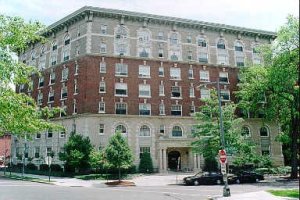You can't blame historic preservation when you make your own bad decision (windows)
Elizabeth Elliott of the Foggy Bottom Association sent these comments from Patrick Sheary to the HistoricWashington yahoogroup. I am taking the liberty of reprinting them.
__________
Regarding the Post's 6-24-06 article, "Home Energy Crunch" subtitled "Condo Costs Hang On Preservationists And Gas Contracts," too bad Mr. Thomason and his condo board didn't do better research on their window project. The new windows that were placed in the Boston House condo building will only last about 15 years when they will need to be replaced again.
A cheaper and equally efficient option would have been to repair the original windows with new weather stripping and storm windows. This operation would have given the same amount of desired energy efficiency that he claims to get now. The sad ending to this story is that the now-tight frames and sashes will wear in time, and they will become just as loose as the older windows were. (Loose or rattling windows and panes falling out don't indicate defective windows but signal instead a lack of maintenance.) The panes of the new windows will eventually fall out, and, if any of them break, the entire unit--not simply just a pane of glass as was done before--will have to be replaced.
Double-glazing is not a new concept--it dates back to the 19th century in the form of storm windows. Speaking of storm windows, many manufacturers make very good and practical ones and they would have cost a fraction of what was paid for replacements AND you would have still gotten a reduction in fuel costs.
I know because we restored (not replaced) the windows in my historic, cooperative building, the Northumberland, which is nearly 100 years old. Not only do the restored windows look beautiful and work well, but also, because of the new weather stripping, our 96-year-old windows are efficient. Replacement of our windows would have doubled our costs. Additionally, in our case, the original windows were so well made from old growth wood, that taking them out and throwing them into the dump would have been a tragedy because you simply cannot get this quality product anymore.
 Northumberland Apartments, Washington, DC
Northumberland Apartments, Washington, DCIn a related matter, it's interesting to me how everyone talks about being "green," which is a good concept, and proceeds to replace windows that are then just thrown in the dump when they could have been restored. Restoration would certainly been much more environmentally friendly. Unfortunately, it seems that people don't equate the option of window and door restoration as being "green," especially when the friendly window person is pushing for replacement (remember he is making a commission on what he sells to you).
I sincerely hope that the new Boston house windows aren't vinyl. Vinyl windows can be very toxic and lead leaches out of vinyl as it degrades in the sun. That leaves the choice of much less energy efficient metal frames.
It is not fair to berate the Historic Preservation Office on this issue. It's apparent many times that the Post hasn't done its homework on prservation, given the essays like this one that I've read unfairly criticizing preservationists. Mr. Thomason is very lucky I don't head the preservation office because window replacement for older buildings would cease and restoration would be the only option. And, finally, to Mr. Thomason, good job on the solar panels and new furnace, and my condolences regarding the windows.
____________
For Windows resources, check out:
-- Windows and Doors for Historic Buildings* (DC Historic Preservation Office)
-- Your Windows (Community Design Center of Pittsburgh)
-- Preservation Brief 9: The Repair of Historic Wooden Windows (National Park Service)
-- Preservation Brief 13: The Repair and Thermal Upgrading of Historic Steel Windows (NPS)
-- Preserving and restoring old windows (Old House Web)
and from time to time, Historic Mount Pleasant sponsors workshops on window repair, and the Capitol Hill Restoration Society has a good publication, not available online, on windows. Although most of these publications and seminars refer to single family houses...
One issue this article raises is the need for more focused information and/or workshops for association members, residents, and managers of historic multiunit residential buildings.
Index Keywords: historic-preservation; energy



0 Comments:
Post a Comment
<< Home